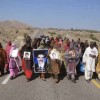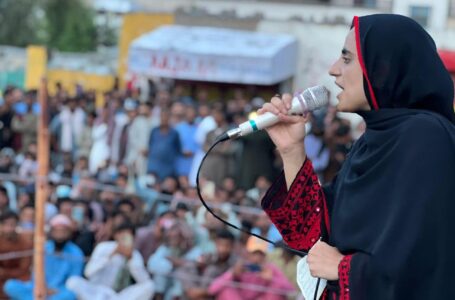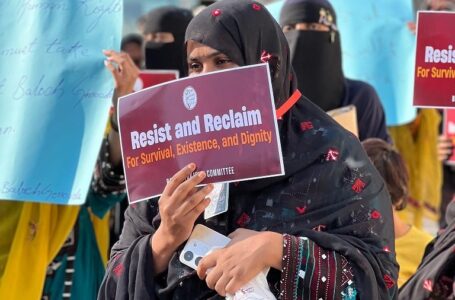FBM Holds Simultaneous Protests Against Pakistan’s Nuclear Tests on Baloch Land
The missing cause

by Amar Guriro
It’s been a year since Baloch leader Mama Qadeer Baloch entered Islamabad after the 2,800 kilometre-long march from Quetta to Islamabad via Karachi for the safe release of abducted Baloch activists.
Under the aegis of the Voice of Missing Baloch Persons (VMBP), on October 27, 2013, Mama, accompanied by some 30 women, started from Quetta, Balochistan. Less than a month later, on November 23, they reached Karachi, where a large number of Sindhi nationalists and media persons welcomed them warmly. After a few days’ stay in Karachi, they embarked on their long journey to Punjab and reached Islamabad on February 28, 2014.
A year on, “the abductions and number of dead bodies have increased,” says Mama Qadeer, while sitting at the protest camp at the Karachi Press Club.
The total number of missing persons was 18,000 when Mama and his fellow marchers began the protest. “Pakistani law enforcement agencies have accelerated abductions. Last year alone about 4,000 Baloch activists went missing,” he says.
Disappointed with the response from Pakistan government, Mama has decided to walk from Pakistan to Geneva, Switzerland — to record a protest with the United Nations at its headquarter.
“We are continuously corresponding with the United Nations. We will soon leave for Geneva — because we don’t think we will get justice by protesting in Pakistan. Almost all arrangements are complete,” says Mama.
A few family members of the missing Baloch persons will be joining him on the journey to Geneva. They are in the process of applying for visas for countries they will be travelling through enroute Switzerland.
While sitting in a camp outside the Karachi Press Club, Mama discloses that abductions, killings and dumping of dead bodies of Baloch activists, Balochistan is now being handed over to religious extremists. “The state is supporting religious. extremists to establish madrassahs in different parts of the province.”
Also, he says, locals are being forced to leave their native places —“The mass migration of locals is somehow not being reported in media”.
Residents of Shahrag, Shapik, Kahan, Kohlu, Tajgaan and other areas, where public schools and markets have shut down for the last many months, are migrating to safer places.
Mama Qadeer Baloch is leading the protests for the release of the Baloch activists since 2009 when his own son Jalil Reiki, a leader of Baloch Republican Party (BRP) was abducted and his bullet riddled body was dumped in the Aap Sar area of Turbat two years after his abduction. “I can feel the pain of family members of every abducted Baloch activist,” he says.
Increasing number of missing persons and tightened security in Balochistan has forced separatists to curtail their activism. Rarely are journalists allowed to cover the protests by Baloch activists. For this reason, separatists are moving to Karachi, where it is relatively easy to voice their demands and hold protests.
Baloch activists demonstrating outside the Karachi Press Club have been on hunger strike for many months which would not be possible in Quetta or any other city in Balochistan.
But even in the safer environs of Karachi no one seems to listen to their demands.
For journalist Shahzada Zulfiqar, nothing has changed in a year — “When there is no rule of law and the law is not applicable in the same way for everyone, we cannot expect anything…”
Vice Chairman Human Rights Commission of Pakistan (HRCP)Asad Iqbal Butt, who recently compiled a detailed reports on various parts of Balochistan, says the situation has only worsened with the passage of time — “During our fact finding mission in Balochistan, we noticed a new phenomena, that rather than abducting themselves, the law enforcement agencies are handing over Baloch to religious extremists and have asked the groups to kill them in the name of religion”.
He discloses that under the patronage of law enforcement agencies, Balochistan is divided into four regions and each one is handed over to different militant groups. “We came to know that religious extremists had abducted a young man in a remote village in Balochistan and blamed him for spying against them. They killed him and ordered his family to not perform the funeral rituals.”
Butt says in recent months around 12 bullet-riddle bodies of Baloch and Sindhi nationalists have been found in different parts of Karachi. “They did the same in East Pakistan and Fata, but they haven’t learnt any lesson. So, I don’t think Mama Qadeer Baloch’s long march will bring a change,” he regrets.










